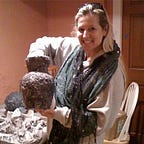Sustainable Funeral Feasts
Make it a Meatless Mourning
Despite amazing advances in medical science and technology, the mortality rate for human beings stands at 100 percent. It’s a fact: All of us are going to die someday. Yet, in the face of this statistical reality, death still manages to come as a shock, leaving rattled relatives, friends and coworkers wondering what to say and do in response.
When the crowds come to show their respect, they descend upon the grieving household, with their favorite recipe prepared in a dish that need not be returned — even if it is vintage Pyrex in avocado green or tangerine orange.
Traditionally women prepared funeral feasts that made the day — great amounts of soup-laden casseroles, aspics, and pound cakes. Wakes meant casseroles, ham, sandwiches, potato salad, basic “mom is here to take care of you” food for a wearisome day.
Women are natural collaborators; the sustainable food and farming movement would not be what it is today without a lot of collaboration. Women are also innate nurturers. We take care of our families and show our love through food, by cooking and preparing meals. We make a lot of the household decisions and have a huge impact on what items move off the shelves at the grocery stores. As decision makers and as food providers, we have changed the commerce of food and have told the food industry that we want more organic food on the shelves.
At one time, biscuits filled with Virginia ham were a staple of Southern funeral buffets. On the East Coast, large platters of delicious Austrian and German cold cuts, cured meats, cheeses, pickled herring and pickled or deviled eggs were the norm. Now celebrations of life have environmental signage to help take the confusion out of what’s recyclable, what’s reusable and what’s compostable. Things change, but food remains a comfort.
Sustainable funeral foods start with fresh ingredients — meat from humanely raised cattle with no added hormones or antibiotics. Broths and fillings are made from scratch using fresh produce that is chemical-free, pesticide-free, and grown locally whenever possible. No additives or preservatives of any kind. No lard, canola oil, gluten or that evil trans-fat.
You recycle your organic wine bottles, compost fair-trade zucchini peel, and read Mother Jones by low-energy light-bulb. Why not walk a green walk when you walk no longer?
Eat local, eat seasonal. Collect your ingredients out of a community garden and share that homegrown produce. Make it a meatless, mourning!
